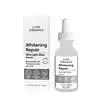What's inside
What's inside
 Key Ingredients
Key Ingredients

 Benefits
Benefits

 Concerns
Concerns

No concerns
 Ingredients Side-by-side
Ingredients Side-by-side

Water
Skin ConditioningAscorbyl Glucoside
AntioxidantPropylene Glycol
HumectantThioctic Acid
AntioxidantPropanediol
SolventNiacinamide
SmoothingDimethyl Isosorbide
SolventPhenoxyethanol
PreservativeChlorphenesin
AntimicrobialChondrus Crispus Extract
Skin ConditioningXanthan Gum
EmulsifyingSodium Polyacrylate
AbsorbentSodium Hydroxide
BufferingSodium Citrate
BufferingTrisodium Ethylenediamine Disuccinate
Caprylyl Glycol
EmollientGluconolactone
Skin ConditioningCitric Acid
BufferingSodium Benzoate
MaskingSodium Hyaluronate
HumectantWater, Ascorbyl Glucoside, Propylene Glycol, Thioctic Acid, Propanediol, Niacinamide, Dimethyl Isosorbide, Phenoxyethanol, Chlorphenesin, Chondrus Crispus Extract, Xanthan Gum, Sodium Polyacrylate, Sodium Hydroxide, Sodium Citrate, Trisodium Ethylenediamine Disuccinate, Caprylyl Glycol, Gluconolactone, Citric Acid, Sodium Benzoate, Sodium Hyaluronate
Water
Skin ConditioningNiacinamide
SmoothingGlycerin
HumectantDipropylene Glycol
HumectantButylene Glycol
Humectant1,2-Hexanediol
Skin ConditioningHydroxyethyl Urea
HumectantGlycereth-25 PCA Isostearate
EmulsifyingTranexamic Acid
AstringentZinc PCA
HumectantHippophae Rhamnoides Fruit Extract
Skin ConditioningAllantoin
Skin ConditioningSodium Hyaluronate
HumectantGlycosyl Trehalose
Emulsion StabilisingAcrylates/C10-30 Alkyl Acrylate Crosspolymer
Emulsion StabilisingPanthenol
Skin ConditioningHydrogenated Starch Hydrolysate
HumectantSodium Polyacrylate
AbsorbentBetaine
HumectantTromethamine
BufferingPhenyl Trimethicone
Skin ConditioningPolyglyceryl-10 Oleate
Skin ConditioningEthylhexylglycerin
Skin ConditioningHydrogenated Lecithin
EmulsifyingDisodium EDTA
Tocopherol
AntioxidantWater, Niacinamide, Glycerin, Dipropylene Glycol, Butylene Glycol, 1,2-Hexanediol, Hydroxyethyl Urea, Glycereth-25 PCA Isostearate, Tranexamic Acid, Zinc PCA, Hippophae Rhamnoides Fruit Extract, Allantoin, Sodium Hyaluronate, Glycosyl Trehalose, Acrylates/C10-30 Alkyl Acrylate Crosspolymer, Panthenol, Hydrogenated Starch Hydrolysate, Sodium Polyacrylate, Betaine, Tromethamine, Phenyl Trimethicone, Polyglyceryl-10 Oleate, Ethylhexylglycerin, Hydrogenated Lecithin, Disodium EDTA, Tocopherol
 Reviews
Reviews

Ingredients Explained
These ingredients are found in both products.
Ingredients higher up in an ingredient list are typically present in a larger amount.
Niacinamide is a multitasking form of vitamin B3 that strengthens the skin barrier, reduces pores and dark spots, regulates oil, and improves signs of aging.
And the best part? It's gentle and well-tolerated by most skin types, including sensitive and reactive skin.
You might have heard of "niacin flush", or the reddening of skin that causes itchiness. Niacinamide has not been found to cause this.
In very rare cases, some individuals may not be able to tolerate niacinamide at all or experience an allergic reaction to it.
If you are experiencing flaking, irritation, and dryness with this ingredient, be sure to double check all your products as this ingredient can be found in all categories of skincare.
When incorporating niacinamide into your routine, look out for concentration amounts. Typically, 5% niacinamide provides benefits such as fading dark spots. However, if you have sensitive skin, it is better to begin with a smaller concentration.
When you apply niacinamide to your skin, your body converts it into nicotinamide adenine dinucleotide (NAD). NAD is an essential coenzyme that is already found in your cells as "fuel" and powers countless biological processes.
In your skin, NAD helps repair cell damage, produce new healthy cells, support collagen production, strengthen the skin barrier, and fight environmental stressors (like UV and pollution).
Our natural NAD levels start to decline with age, leading to slower skin repair, visible aging, and a weaker skin barrier. By providing your skin niacinamide, you're recharging your skin's NAD levels. This leads to stronger, healthier, and younger looking skin.
Another name for vitamin B3 is nicotinamide. This vitamin is water-soluble and our bodies don't store it. We obtain Vitamin B3 from either food or skincare. Meat, fish, wheat, yeast, and leafy greens contain vitamin B3.
The type of niacinamide used in skincare is synthetically created.
Learn more about NiacinamideSodium Hyaluronate is hyaluronic acid's salt form. It is commonly derived from the sodium salt of hyaluronic acid.
Like hyaluronic acid, it is great at holding water and acts as a humectant. This makes it a great skin hydrating ingredient.
Sodium Hyaluronate is naturally occurring in our bodies and is mostly found in eye fluid and joints.
These are some other common types of Hyaluronic Acid:
Learn more about Sodium HyaluronateSodium Polyacrylate is the sodium salt of polyacrylic acid. It is used as an absorber, emollient, and stabilizer.
This ingredient is a super-absorbent polymer - meaning it can absorb 100 to 1000 times its mass in water. As an emollient, Sodium Polyacrylate helps soften and soothe skin. Emollients work by creating a barrier to trap moisture in. This helps keep your skin hydrated.
Water. It's the most common cosmetic ingredient of all. You'll usually see it at the top of ingredient lists, meaning that it makes up the largest part of the product.
So why is it so popular? Water most often acts as a solvent - this means that it helps dissolve other ingredients into the formulation.
You'll also recognize water as that liquid we all need to stay alive. If you see this, drink a glass of water. Stay hydrated!
Learn more about Water